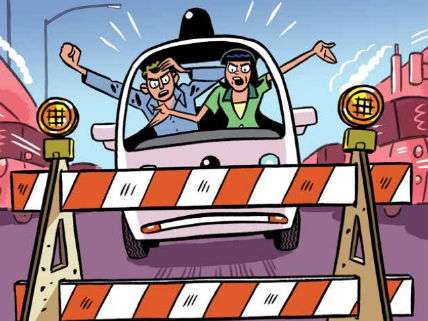First Driverless Car Insurance Offered
Safer cars mean lower rates

Automobile accidents will become rarer as self-driving vehicles take to the highways in the coming decade. Earlier this year, researchers at Virginia Tech reported that self-driving cars are already safer - they crashed 3.2 times per every million miles traveled versus 4.2 crashes per million miles traveled by conventional automobiles. Nevertheless, insurance companies have been reluctant to cover driverless vehicles so far. Does liability accrue to the owner, the manufacturer, the software supplier, etc.? The British insurance company Adrian Flux has just jumped in and is now ordering policies to cover driverless vehicles. As the press release from the company explained:
The new driverless policy has additional features over a standard car insurance policy. Customers will be covered for loss or damage in the following scenarios:
- If updates or security patches for things like firewalls, operating systems, electronic mapping and journey planning systems haven't been successfully installed in the vehicle within 24 hours of the owner being notified by the manufacturer or software provider, subject to an increased policy excess
- If there are satellite failure / outages that affect the navigation systems, or if the manufacturer's operating system or authorised software fails
- Where there is loss or damage caused by failing, when able, to use manual override to avoid a collision or accident in the event of operating system, navigation system or mechanical failure.
- For loss or damage if your car gets hacked or an attempted hack results in loss or damage.
The company evidently expects cars equipped with self-driving features to be involved in fewer accidents, so insurance rates will be correspondingly lower. Perhaps some American insurers will now be encouraged go into this line of business.
If you were a subscriber to the magazine, you'd already have been reading my cover article, "Will Politicians Block Our Driverless Future?" Just saying.
Editor's Note: As of February 29, 2024, commenting privileges on reason.com posts are limited to Reason Plus subscribers. Past commenters are grandfathered in for a temporary period. Subscribe here to preserve your ability to comment. Your Reason Plus subscription also gives you an ad-free version of reason.com, along with full access to the digital edition and archives of Reason magazine. We request that comments be civil and on-topic. We do not moderate or assume any responsibility for comments, which are owned by the readers who post them. Comments do not represent the views of reason.com or Reason Foundation. We reserve the right to delete any comment and ban commenters for any reason at any time. Comments may only be edited within 5 minutes of posting. Report abuses.
Please to post comments


Since I don't drive for a living, I invite the driver-less car.
Some 40,000+ people die every year due to human-factor car accidents.
Thanks to driver-less cars, that number can approach ZERO.
Surrender all autonomy in the name of safety!
Reposting until everyone sees it.
Check
Funny, but shopped.
Don't care.
I care. The hole in that doughnut doesn't begin to represent Hillary.
I don't think a 'long john' would affect the joke on as many people.
It's an onion ring.
I, for one, welcome our new robot chauffeurs.
I thought the first driverless policy was going to be offered by this guy:
Vern Fonk's Greatest Insurance Ad Ever
I don't see driverless cars being banned or regulated into irrelevance. Reducing injury and loss of life on the road will be a politically salient argument. Most likely human-operated cars will suffer that fate, as animus builds toward those who drive for pleasure for 'needlessly endangering everyone on the road.'
Untill they realize that it will put thousands of truckers and transportation fellows out of business.
Oh that one is easy. In fact, self driving vehicles will result in more commercial drivers being necessary (because of regulation)
Federal Rules will naturally mandate commercial self driving vehicles must always have a real person in the driver seat.
All the other requirements about said driver must also be met. Logs, hours, drug test, etc
There will also be a new requirement on the drivers. This is the one that will of a necessity create a need for more drivers.
Since commercial drivers won't be holding the reins personally their driving skill will be compromised. Thus a new rule will mandate they must also complete a certain # of hours in a driving simulator each month. The hours in this simulator will count towards their maximum service hours which means the individual drivers will be on the road fewer hours which means you need more real drivers to move the same amount of freight.
Yeah, im more worried about human-driving getting regulated away. Driverless cars have the added advantage of being easier for the government to track you.
Not just track you, but lock the doors remotely, override the navigation, and drive you directly to a police station garage-jail.